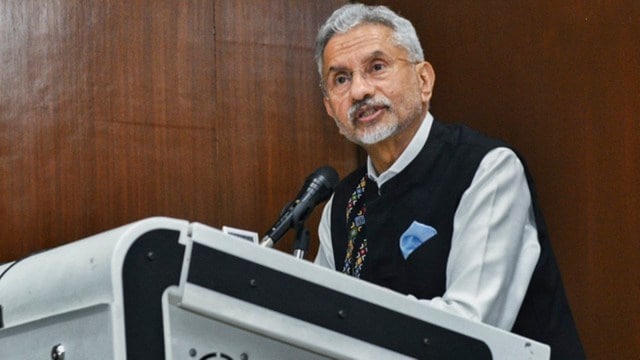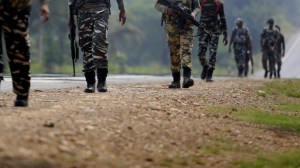
Briefing an all-party meeting earlier in the day, Jaishankar said India was maintaining a wait-and-watch strategy while keeping its security forces on alert. v“Since the election in January 2024, there has been considerable tensions, deep divides and growing polarisation in Bangladesh politics. This underlying foundation aggravated a student agitation that started in June this year. There was growing violence, including attacks on public buildings and infrastructure, as well as traffic and rail obstruction. The violence continued through the month of July,” Jaishankar said in Parliament.
“Throughout this period, we repeatedly counselled restraint and urged that the situation be defused through dialogue. Similar urgings were made to various political forces with whom we were in touch. Despite a Supreme Court judgment on July 21, there was no let-up in the public agitation. Various decisions and actions taken thereafter only exacerbated the situation,” he said, adding that the agitation “coalesced around a one-point agenda, that is that Prime Minister Sheikh Hasina should step down.”
“On August 5, demonstrators converged in Dhaka despite the curfew. Our understanding is that after a meeting with leaders of the security establishment, Prime Minister Sheikh Hasina apparently made the decision to resign. At very short notice, she requested approval to come for the moment to India. We simultaneously received a request for flight clearance from Bangladesh authorities. She arrived yesterday evening in Delhi,” he said.
“Properties of individuals associated with the regime were torched across the country. What was particularly worrying was that minorities, their businesses and temples also came under attack at multiple locations. The full extent of this is still not clear,” he said.
“There are reports of initiatives by various groups and organisations to ensure their (minorities’) protection and well-being. We welcome that, but will naturally remain deeply concerned till law and order is visibly restored. Our border guarding forces have also been instructed to be exceptionally alert in view of this complex situation,” he said.
Story continues below this ad
Jaishankar said there were 19,000 Indians in Bangladesh, of which 9,000 were students, and the government was in “close, continuous touch” with the Indian community through its diplomatic missions.
“The bulk of the students have already returned to India in the month of July on the advice of the High Commission. In terms of our diplomatic presence, in addition to the High Commission in Dhaka, we have Assistant High Commissions in Chittagong, Rajshahi, Khulna and Sylhet. It is our expectation that the host government will provide the required security protection for these establishments. We look forward to their normal functioning once the situation stabilises,” he said.
“In the last 24 hours, we have also been in regular touch with the authorities in Dhaka. This is the situation as of now. I seek the understanding and support of the House in regard to sensitive issues regarding an important neighbour on which there has always been strong national consensus,” he said.
At the all-party meeting, the Opposition parties are understood to have expressed support to the government on the issue. “Briefed an all-party meeting in Parliament today about the ongoing developments in Bangladesh. Appreciate the unanimous support and understanding that was extended,” Jaishankar said in a post on X.
Story continues below this ad
Jaishankar briefed the parties on the possible impact on India. When Leader of Opposition in Lok Sabha Rahul Gandhi asked about the possible role of external forces, Jaishankar said the government only has “information about a Pakistan diplomat’s changed DP that shows his support to the uprising”, sources said.
Asked about Hasina’s plans, Jaishankar is learnt to have said that India had spoken to her about her future course of action, but the details could not be disclosed at the moment.
Sources said Gandhi also asked about the possible role of any “foreign forces, particularly China” in Bangladesh and the safety of minorities there. Jaishankar responded that the minorities were under attack, and the Indian government would take appropriate steps to ensure their safety.
Jaishankar told the meeting that the Centre has alerted its security forces and was in touch with the Bangladesh Army too. “Work is underway to ensure the safety and security of our country,” he was quoted as saying by a leader who attended the meeting.
Responding to Gandhi’s question on the government’s short-term strategy, Jaishankar said India was prepared to take all necessary steps if the situation deteriorates, said sources.
Story continues below this ad
Senior Congress leader K C Venugopal, DMK’s T R Baalu, JD(U)’s Lalan Singh, SP’s Ram Gopal Yadav, TMC’s Sudip Bandyopadhyay and Derek O’Brien, RJD’s Misa Bharti, Shiv Sena (UBT)’s Arvind Sawant, BJD’s Sasmit Patra, NCP (SP)’s Supriya Sule and TDP’s Ram Mohan Naidu were among others present.
With the AAP not being invited, party leader Sanjay Singh said “excluding a national party with three MPs in Lok Sabha and 10 MPs in Rajya Sabha from the all-party meeting shows the government’s lack of seriousness and obnoxious mindset”. He, however, added that the party would stand with the government on the issue.
The TMC leaders asked the Centre to keep the West Bengal government in the loop on the developments. “Because it is the state that is going to absorb all the pressures of the developments in Bangladesh,” TMC leader Derek O Brien told reporters later.
When Shiv Sena (UBT)’s Sawant asked about the number of Bangladeshis who had come to the border, Jaishankar said there was no clarity on the issue. RJD’s Misa Bharti sought steps to ensure security of the Indians living in Bangladesh.










